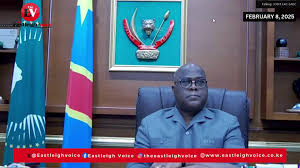
In order to stabilize the Democratic Republic of Congo (DRC) under the combined Nairobi-Luanda processes, President William Ruto has called for international assistance for the EAC-SADC joint efforts.
Ruto stressed the need for consistent funding for peace projects like the DRC process in his speech to Heads of Missions and International Organizations on Monday as part of the diplomatic corps.
He pointed out that a lot of initiatives fail because of irregular funding, which causes delays that leave gaps and raise the possibility of more violence.
He said, “We urge our international partners to support these missions to ensure their success,” in his yearly diplomatic speech for the start of the New Year.
In order to ensure sufficient money for successful peace building, Ruto emphasized the necessity of a systematic and predictable process for financing peace initiatives and urged governments and international organizations to work together.

“As EAC Chair, I echo the calls of the AU, SADC, UN, G7, European Union, Britain, the United States, and others for all parties in the DRC conflict to prioritize negotiations and commit to achieving lasting peace,” he declared.
In order to create a Joint Technical Team under the two regional secretariats, Ruto stated that the ministers of the SADC and the EAC will meet jointly.
The team will create a unified plan for funding, guaranteeing responsibility, and rallying partner support, he said.
Maintaining the EAC-SADC peace program in the DRC requires a systematic approach to funding and international engagement, the President underscored.
Furthermore, Ruto urged the DRC government to protect peace missions and diplomatic workers, saying, “It is regrettable that diplomatic missions and peacekeeping forces, including SADC and UN personnel, have come under attack in the DRC.”
This appeal comes after the EAC and SADC Summit on the DRC situation on Saturday, where leaders issued directives to unite the peace processes in Luanda and Nairobi and to resume direct talks and communication between Kinshasa, M23, and other non-state actors in the combined process.
In order to improve their complementarity, the regional leaders decided to strengthen each peace process separately, acknowledging that both were essential.
They underlined that the DRC crisis can still only be resolved via political and diplomatic engagement.
Ruto, the chairperson of the EAC Summit, emphasized that peace is the only workable solution and called on all sides to the Eastern DRC conflict to put an end to fighting and embrace dialogue.
“We reiterate our call for an immediate cessation of hostilities and urge all parties to engage in meaningful dialogue for lasting peace,” he added.
He emphasized that the Eastern Democratic Republic of the Congo’s violence is a result of long-standing political, economic, and historical problems that have been made worse by outside forces.
“There is also a clandestine international dimension at play, whose persistent and destructive effects must neither be underestimated nor ignored any longer,” he continued.
Following the recent capture of Goma, the largest city in the Eastern Democratic Republic of the Congo, President Ruto urged the M23 rebel group to stop its progress, emphasizing that military actions alone cannot end the situation.
He also warned that a prolonged conflict will only make the humanitarian situation worse and urged the Congolese military to abstain from reprisal assaults.

